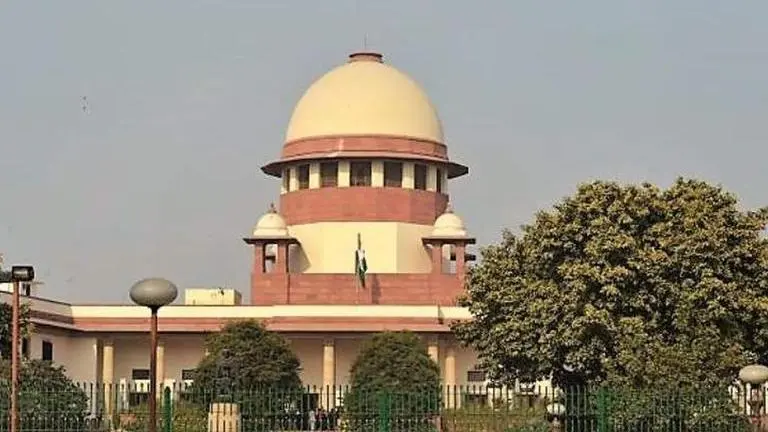Updated 29 October 2020 at 17:41 IST
SC gives time till Dec 31 to Centre for granting permanent commission to women officers in Navy
The Supreme Court Thursday extended till December 31 the deadline for implementation of its judgement on grant of permanent commission (PC) to women SSC officers in the Indian Navy.
- India News
- 4 min read

The Supreme Court Thursday extended till December 31 the deadline for implementation of its judgement on grant of permanent commission (PC) to women SSC officers in the Indian Navy.
The top court had on March 17, maintaining that women and men officers should be treated equally, cleared PC for women in the Navy and asked the Centre to complete the modalities within three months.
A bench of Justices D Y Chandrachud, Indu Malhotra and Indira Banerjee said that it is extending time till December 31 for grant of PC to Short Service Commission (SSC) women officers in the Indian Navy.
The Centre moved the application in June for extending the deadline by six months citing the COVID-19 pandemic.
Advertisement
The bench also asked the Centre to provide Rs 25 lakh compensation each in four weeks to five Naval women officers, who were not considered for the PC besides the pensionary benefits, which had already been given to them.
Pursuant to the top court's verdict in February, the Centre has started the process for granting permanent commission to all women SSC officers in Indian Army.
Advertisement
On March 17, in a major verdict, the top court had paved the way for granting permanent commission to women officers in Indian Navy, saying a level playing field ensures that women have the opportunity to overcome "histories of discrimination".
The battle for gender equality is about confronting the battles of the mind and history is replete with examples where women have been denied their just entitlements under law and the right to fair and equal treatment in the workplace, the top court had said.
"A hundred and one excuses are no answer to the constitutional entitlement to dignity, which attaches to every individual irrespective of gender, to fair and equal conditions of work and to a level playing field," the top court had said, giving three months to the Centre to work out the modalities.
It had said the Centre's contention that certain sea-going duties are ill-suited to women officers is premised on sex stereotypes that male officers are more suited to certain duties by virtue of the physiological characteristics and to accept it would be to "approve the socially ascribed gender roles which a commitment to equal worth and dignity of every individual belies".
The top court had quashed the prospective effect of the Centre's controversial September 2008 policy, which restricted the grant of permanent commission to certain categories only.
"The stipulation in the policy letter dated September 6, 2008, making it prospective and restricting its application to specified cadres/branches of the Indian Navy shall not be enforced," the top court had said, while setting aside the implementation guidelines issued on December 3, 2008.
"The statutory bar on the engagement or enrolment of women in the Indian Navy has been lifted to the extent envisaged in the notifications issued by the Union Government on October 9, 1991 and November 6, 1998 under Section 9(2) of the Navy Act of 1957," it had held.
The 1991 notification envisaged that the restriction on the appointment or enrolment of women was lifted for specified cadres/branches of the Navy, while the 1998 notification made women eligible for appointment as officers in all the branches of the Indian Navy.
The top court said that all the SSC officers in the education, law and logistics cadres of Navy, who are presently in service, shall be considered for the grant of PC.
The top court said that the period of service after which women SSC officers shall be entitled to submit applications for the grant of PCs shall be the same as their male counterparts.
"A level playing field ensures that women have the opportunity to overcome their histories of discrimination with the surest of responses based on their competence, ability and performance," it said, adding that in the context of the Armed Forces, specious reasons have been advanced by decision makers and administrators, which range from physiology, motherhood and physical attributes to the male dominated hierarchies.
Referring to the verdict of February 17, in which PC was granted to women officers in Indian Army, the top court had said it was held that there was a need to change mind set if equality for women is to be achieved in the Armed Forces.
It had rejected the submissions of the Centre that certain avenues such as sea-sailing duties are ill-suited for women officers as there is no return to the base, unlike in the Army and the Air Force.
The top court had also termed as "illusory and without any foundation", the argument that in vessels of a Russian origin which are deployed by the Indian Navy, no provision has been made for women as sailors and there are no bathrooms to accommodate them.
(Photo Credit: PTI)
Published By : Press Trust Of India
Published On: 29 October 2020 at 17:41 IST
